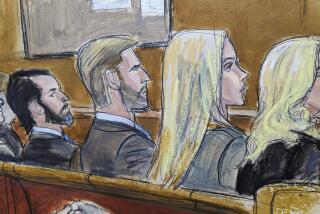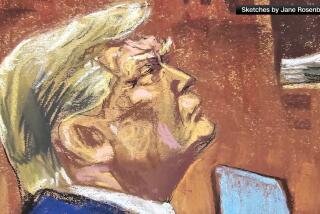A Scandal’s Sad Legacy
- Share via
Americans want the Monica Lewinsky matter over and done with. They want President Clinton to somehow make it go away. But that will not happen, even if Clinton manages to elude legal culpability during today’s scheduled appearance via video before the Whitewater federal grand jury in Washington.
No matter how it is resolved, the Lewinsky controversy has indelibly marked not only Clinton’s legacy but the institution of the presidency itself. Still to come could be a congressional dilemma if independent counsel Kenneth W. Starr should recommend that the House of Representatives bring impeachment proceedings against the president.
Barring some dramatic new development, the House would not relish this course. Democrats are worried about fall elections, and Republicans don’t want any action against Clinton that could give presidential advantage to Vice President Al Gore. Nor, it seems, could two-thirds of the Senate justify removing Clinton from office for what basically appears to be an illicit, but not illegal, sexual affair or for what may be disingenuous but technically defensible testimony in the now dismissed Paula Jones sexual harassment lawsuit. This would be a political fight, not a legal one. Given Clinton’s political skills, it’s one that Congress might prefer to avoid.
If necessary, Clinton might maneuver off the immediate political hook by making a general confession and plea for absolution. Americans know of Clinton’s apparent inability to resist sexual temptation. They elected and reelected him in spite of that. Most don’t believe he is telling the truth, and they don’t seem to care much. But they’d still like him to own up.
All this began in 1994 with an investigation that grew out of a wayward Arkansas land deal that occurred before Clinton even became president. Lurching from one bizarre event to another, the investigation eventually would include the FBI doing DNA tests on a blue dress owned by Lewinsky, a former White House intern.
It’s clear there needs to be a careful reexamination of the independent counsel law when it comes up for renewal next year. Should there be limits on the reach of the independent counsel? One former prosecutor believes jurisdiction should be restricted to misuse of governmental power in office. That is worth serious consideration.
This year’s legal battles may have altered, for the worse, the inner workings of the White House. Forcing government lawyers and Secret Service agents to testify is bound to affect interactions with future presidents. Congress should consider legislation that would spell out just when and how agents could be forced to testify about a president’s movements or conversations.
Congress at least should pass legislation to immunize a president from civil lawsuits during the term in office. The Supreme Court unfortunately lacked the real-world sense to effect such immunization when the justices ruled on the issue. It must be said that Clinton seems to have a talent for pushing his troubles into one corner of his mind as he carries out his work, for which he continues to receive high marks in the polls. Even so, a controversy of this kind surely, to some degree, would be a mental and physical drain on any chief executive. What a distraction; imagine the work that never got done this year and probably will go undone during the remaining two years of Clinton’s term.
The press is properly reexamining its own procedures in covering the Clinton-Lewinsky matter. Fueled by ever-increasing competition in the media, the developments received Watergate-intensity coverage, but this is not Watergate. There is a public right to know, but is there a limit somewhere?
The genesis and still the core of this national upset is Bill Clinton’s own behavior. The furor has been compounded by his distressing habit of issuing vigorous denials and following up, if at all, with lame and ambiguous explanations. His unnatural responses have bred suspicion. No matter what comes out today, there can be no doubt that the president has demonstrated unbelievably bad judgment in whatever his relationship was with Lewinsky. Given the microscope that Clinton knew he was under, going back to the time before he was first elected president, his lack of good judgment in this regard seems not only reckless but compulsive.
That said, we as Americans must ask ourselves: What is it that we now demand of our presidents? Characters so flawless, backgrounds so scrubbed, human inconsistencies so hidden that indeed the Founding Fathers themselves could not withstand the scrutiny of this age?
History offers little guidance. The Founding Fathers carefully considered the procedure of impeachment but not the grounds for removal from office. The only president to be impeached, Andrew Johnson, in 1868, was accused of firing a Cabinet member without notifying the Senate--hardly an impeachable offense today. The action, which fell one vote short in the Senate, really was the outgrowth of a bitter political battle over Reconstruction.
In recent years Washington has had more than its share of nasty, personal, unceasing political battles. Whether it was Democrats successfully going after Supreme Court nominee Robert Bork or unsuccessfully trying to keep Clarence Thomas off the court or Republicans going after Justice Department nominee Lani Guinier or Hillary Clinton, no side displayed an ability to lose gracefully. Those who never could accept Clinton’s election victory targeted his only real political liability--the character issue--from virtually the first day he was in office, and he helped them.
In 1868, Johnson got a definitive vote. In 1998, the Clinton-Lewinsky controversy may just grind to an end without any tidy resolution. But its debilitating legacy will be with us for years to come. .
More to Read
Get the L.A. Times Politics newsletter
Deeply reported insights into legislation, politics and policy from Sacramento, Washington and beyond. In your inbox twice per week.
You may occasionally receive promotional content from the Los Angeles Times.










